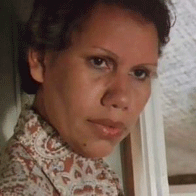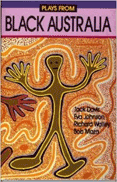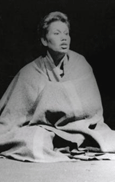Eva Johnson – January 19 2020
 Eva (aka Eva Knowles Johnson and Eva Birrit) is a playwright, poet, actor, director, activist and public speaker. She belongs to the Malak Malak people of the Northern Territory. Eva has worked as an enrolled nurse and drama teacher, studied community development at the South Australian Institute of Technology and holds a degree in Aboriginal studies from the University of Adelaide. As a member of the Stolen Generations, a recurring theme in Eva’s work is the impact on women and children of government policies directed at Indigenous Australians. In 1984, Eva directed the first Aboriginal Women’s Art Festival in Adelaide and in 1987, she was writer/director of the First National Black Playwrights’ Conference in Canberra, from which the Aboriginal National Theatre Trust was developed. Eva’s other plays include When I Die You’ll All Stop Laughing; Bull Bar Tours, co-written with Catherine Fitzgerald; What Do They Call Me?; Heartbeat of the Earth; Two Bob in the Quid; Mimini’s Voices; Onward to Glory and Faded Genes. In 1985 Eva received the Aboriginal Artist of the Year Award and in 1993 she won the Australia Council’s inaugural Red Ochre Award.
Eva (aka Eva Knowles Johnson and Eva Birrit) is a playwright, poet, actor, director, activist and public speaker. She belongs to the Malak Malak people of the Northern Territory. Eva has worked as an enrolled nurse and drama teacher, studied community development at the South Australian Institute of Technology and holds a degree in Aboriginal studies from the University of Adelaide. As a member of the Stolen Generations, a recurring theme in Eva’s work is the impact on women and children of government policies directed at Indigenous Australians. In 1984, Eva directed the first Aboriginal Women’s Art Festival in Adelaide and in 1987, she was writer/director of the First National Black Playwrights’ Conference in Canberra, from which the Aboriginal National Theatre Trust was developed. Eva’s other plays include When I Die You’ll All Stop Laughing; Bull Bar Tours, co-written with Catherine Fitzgerald; What Do They Call Me?; Heartbeat of the Earth; Two Bob in the Quid; Mimini’s Voices; Onward to Glory and Faded Genes. In 1985 Eva received the Aboriginal Artist of the Year Award and in 1993 she won the Australia Council’s inaugural Red Ochre Award.

Murras, published in Plays from Black Australia
Currency Press, 1989; ISBN 9780868192260
Full length, 3 female, 3 male
An Aboriginal woman, Ruby, struggles against hostile and racist society. She loses her husband to alcoholism induced by despair at the loss of his land and culture and she loses her house under authoritarian governmental rehousing policies. She must face other terrible things, too, but the tragic events of her life are offset by her courageous strength. Murras was first produced in 1988 at the Fringe Festival Centre, Adelaide Festival, and later for the Black Theatre Season at Belvoir Street Theatre in Sydney.

Tjindarella
Premiered 1984, Aboriginal Women’s Art Festival, Adelaide
Originally written for 10; re-written for 18 plus a musical band of four Pronounced ‘Ginderella’, the play’s title references the derogatory term ‘Gin’ that was applied to Aboriginal women. The story of an Aboriginal woman scrubbing floors and living on a Mission who dreams of a better life, the Fairy Godmother being the Department of Aboriginal Affairs and the glass slipper representing issues of land rights and social justice, Tjindarella is “a subversive analogy to Disney’s popularised Cinderella …. Johnson’s insight is a critical counter-narrative, but more than this, it is a Malak Malak woman standing up and telling her story, her way; an embodied will to survive, through words, and with a very different outcome to the better-known rags-to-riches ‘happily ever after’ fairytale.” – based on Natalie Harkin, Southerly Journal
